unit 12 i remember meeting all of you in grade 6./section A课件(鲁教版九年级)
文档属性
| 名称 | unit 12 i remember meeting all of you in grade 6./section A课件(鲁教版九年级) |

|
|
| 格式 | zip | ||
| 文件大小 | 282.7KB | ||
| 资源类型 | 教案 | ||
| 版本资源 | 鲁教版(五四学制) | ||
| 科目 | 英语 | ||
| 更新时间 | 2009-11-03 00:00:00 | ||
图片预览

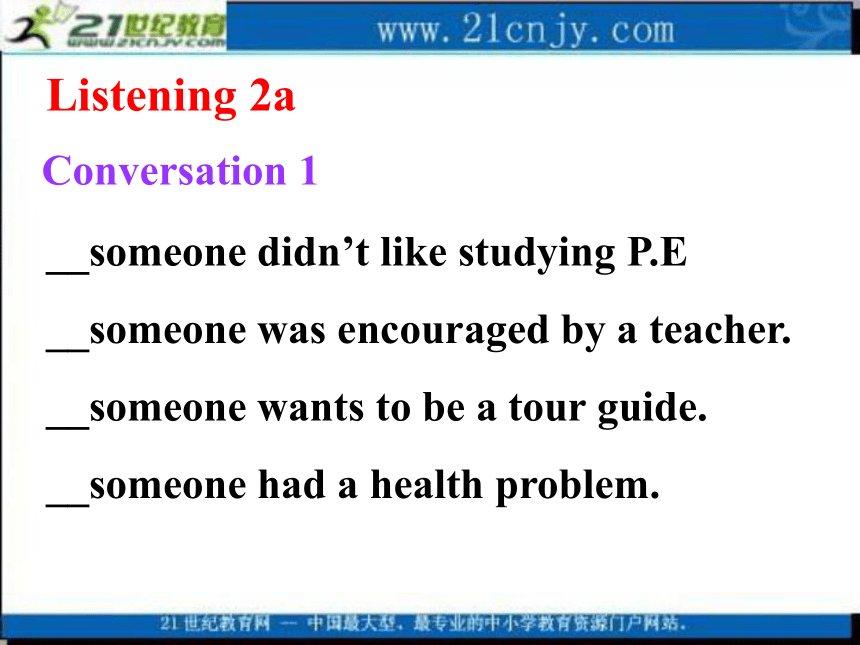
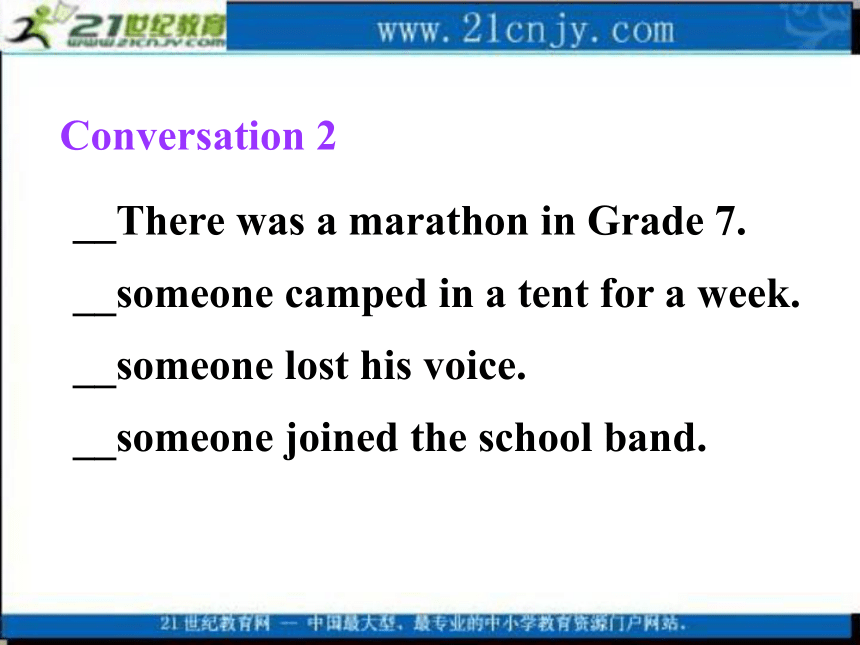


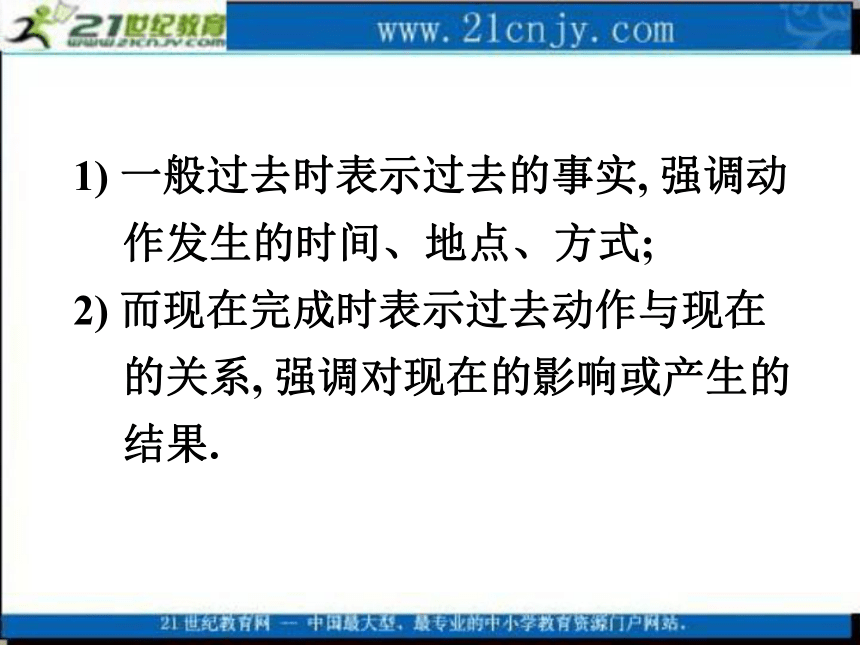
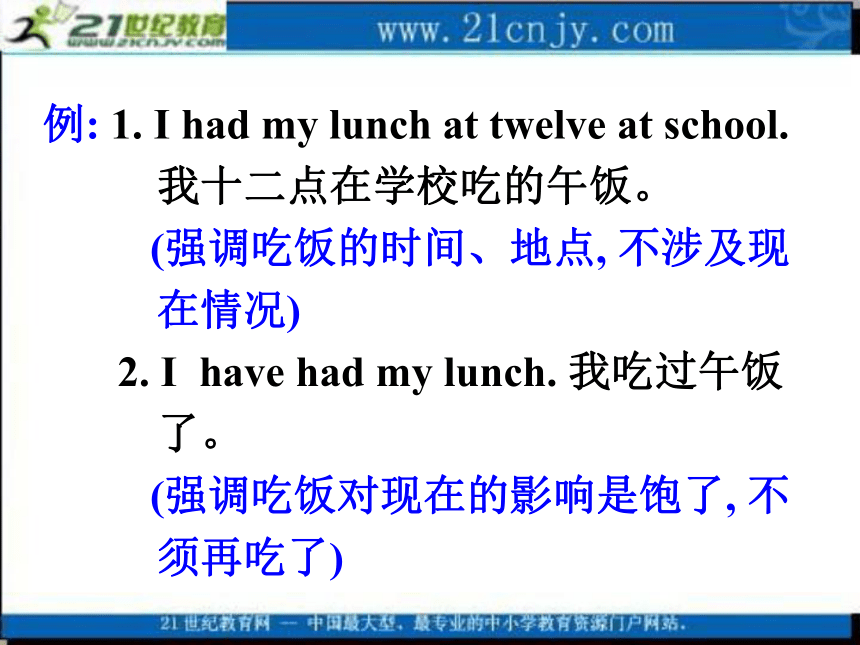
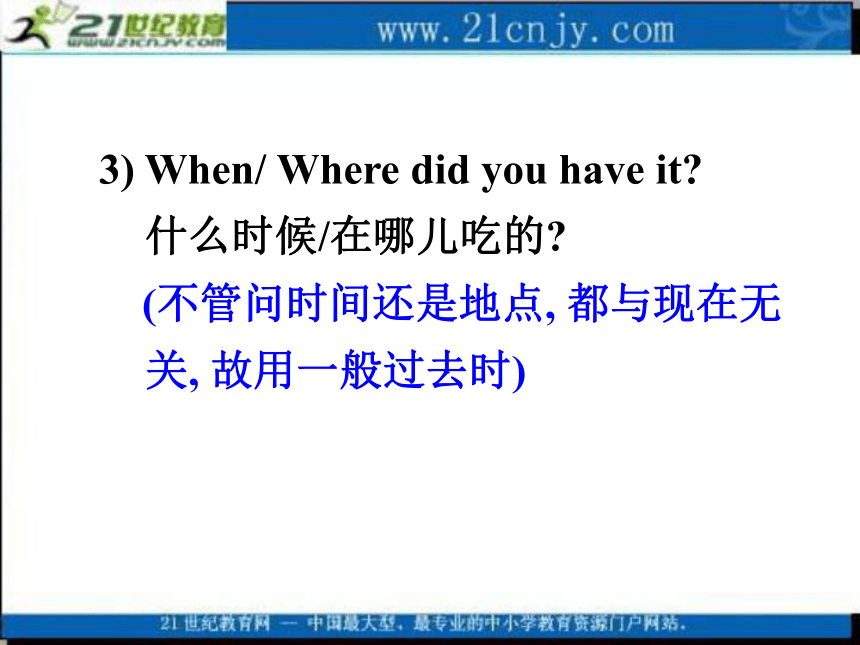
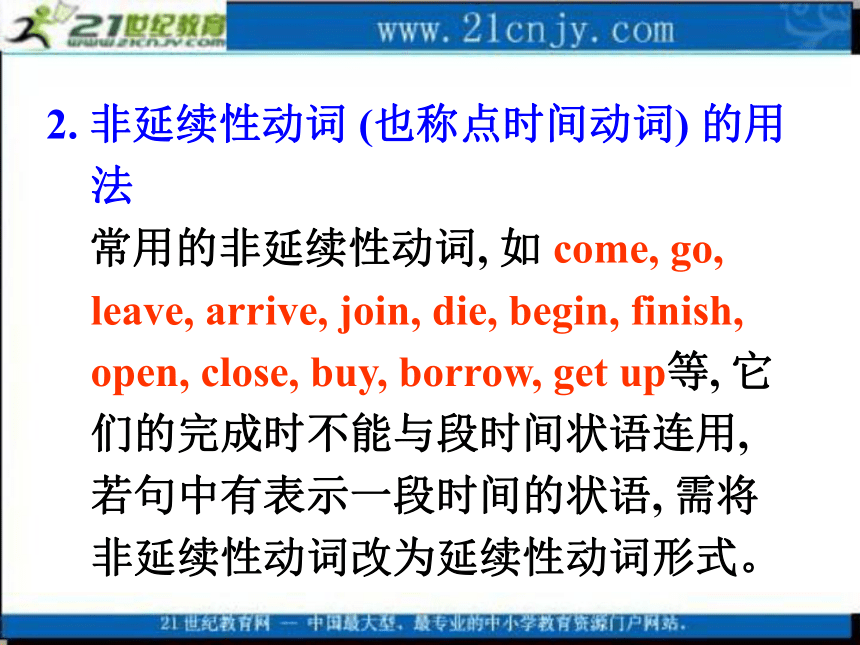
文档简介
课件25张PPT。 Unit 12
I remember meeting
all of you in Grade 6.
Section A Period 2Listening 2a__someone didn’t like studying P.E
__someone was encouraged by a teacher.
__someone wants to be a tour guide.
__someone had a health problem.Conversation 1__There was a marathon in Grade 7.
__someone camped in a tent for a week.
__someone lost his voice.
__someone joined the school band.Conversation 21. Who wants to be a doctor
2.Who told someone to go home
3.Who caught a cold?
4.Who raised the most money for charityListening 2bLisaMariaMr. HuntAlex现在完成时与一般过去时的区别Grammar1) 一般过去时表示过去的事实, 强调动作发生的时间、地点、方式;
2) 而现在完成时表示过去动作与现在的关系, 强调对现在的影响或产生的结果.例: 1. I had my lunch at twelve at school. 我十二点在学校吃的午饭。
(强调吃饭的时间、地点, 不涉及现在情况)
2. I have had my lunch. 我吃过午饭了。
(强调吃饭对现在的影响是饱了, 不须再吃了)3) When/ Where did you have it? 什么时候/在哪儿吃的?
(不管问时间还是地点, 都与现在无关, 故用一般过去时) 2. 非延续性动词 (也称点时间动词) 的用法
常用的非延续性动词, 如 come, go, leave, arrive, join, die, begin, finish, open, close, buy, borrow, get up等, 它们的完成时不能与段时间状语连用, 若句中有表示一段时间的状语, 需将非延续性动词改为延续性动词形式。例: (误) He has come to Jinan for two weeks.
(正) He has been in Jinan for two weeks.
1). come to sp.= be in sp.
2). go to sp. = be in sp.3) leave = be away (from)
例: They left the town two days ago.
They have been away from the town since two days ago.4) join = be in = be a member of/be a ......member
例: She joined the League three months ago.
She has been in the League for three months.She has been a member of the League for three months.
She has been a League member since three months ago.5) die = be dead
例: The man died five years ago.
The man has been dead for five years.
6) begin = be on
例: The film began ten minutes ago.
The film has been on since ten minutes ago.7) buy = have
例: We bought the house two years ago.
We have had the house for two years.
8) borrow = keep
例: She borrowed the books a week ago.
She has kept the books for a week.
9) open = be open; close = be closed get up = be up finish = be over; 3. 固定句式:
It is / has been + 段时间 + since 从句 (用一般过去时)
例: It is has been two days since he left for America.
It is /has been a year since they joined the army.
It is / has been ten years since the hospital opened. 1. I remember meeting all of you in Grade 6.
remember doing sth . 是“记得曾做过某事”。如:
I remember posting the letter. 我记得 (已) 把信寄了Explanation〖提示〗remember to do sth. 是“记住要去做某事”。如:
Remember to post the letter. 记住要发那封信。2. used to be sacred of a teacher
used to + do: “过去常常”表示过去习惯性的动作或状态, 但如今已不存在。
Mother used not to be so forgetful. Scarf used to take a walk. (过去常常散步)be used to + doing: 对……已感到习惯, 或“习惯于”, to是介词, 后需加名词或动名词。
He is used to smoking.
He is used to taking a walk. (现在习惯于散步)3. I have the ability to do good work.
ability 为名词, 通常会用在表达
a. 有能力去做什么事 ability to do sth
例: He has the ability to get the job done quickly. 他有能力把工作迅速完成。 指有什么样的能力reading/writing/teaching/acting ability
例: Noel’s writing ability was confirmed at a fairly young age. 诺尔的写作能力在很年轻的时候就被肯定了。在哪种学科或语言上的能力
ability in
例: I want to improve my ability in Mathematics. 我想要改善我的数学计算能力。
be able to为动词词组
表示人能够做什么, 而且通常是不令人惊讶的一般能力 例: Will you be able to get out of bed after a few days? 你几天后就能够下床了吗?
例: Lily is able to play with us on Sunday. 连恩星期天就能和我们一起出去玩了。 4. I want to make my parents and teachers proud of me.
proud? a. 骄傲的,自豪的
例句: Tom is very proud of his new car. 汤姆非常满意自己的新车。
They were poor but proud. 他们虽然穷, 但很有骨气。
I remember meeting
all of you in Grade 6.
Section A Period 2Listening 2a__someone didn’t like studying P.E
__someone was encouraged by a teacher.
__someone wants to be a tour guide.
__someone had a health problem.Conversation 1__There was a marathon in Grade 7.
__someone camped in a tent for a week.
__someone lost his voice.
__someone joined the school band.Conversation 21. Who wants to be a doctor
2.Who told someone to go home
3.Who caught a cold?
4.Who raised the most money for charityListening 2bLisaMariaMr. HuntAlex现在完成时与一般过去时的区别Grammar1) 一般过去时表示过去的事实, 强调动作发生的时间、地点、方式;
2) 而现在完成时表示过去动作与现在的关系, 强调对现在的影响或产生的结果.例: 1. I had my lunch at twelve at school. 我十二点在学校吃的午饭。
(强调吃饭的时间、地点, 不涉及现在情况)
2. I have had my lunch. 我吃过午饭了。
(强调吃饭对现在的影响是饱了, 不须再吃了)3) When/ Where did you have it? 什么时候/在哪儿吃的?
(不管问时间还是地点, 都与现在无关, 故用一般过去时) 2. 非延续性动词 (也称点时间动词) 的用法
常用的非延续性动词, 如 come, go, leave, arrive, join, die, begin, finish, open, close, buy, borrow, get up等, 它们的完成时不能与段时间状语连用, 若句中有表示一段时间的状语, 需将非延续性动词改为延续性动词形式。例: (误) He has come to Jinan for two weeks.
(正) He has been in Jinan for two weeks.
1). come to sp.= be in sp.
2). go to sp. = be in sp.3) leave = be away (from)
例: They left the town two days ago.
They have been away from the town since two days ago.4) join = be in = be a member of/be a ......member
例: She joined the League three months ago.
She has been in the League for three months.She has been a member of the League for three months.
She has been a League member since three months ago.5) die = be dead
例: The man died five years ago.
The man has been dead for five years.
6) begin = be on
例: The film began ten minutes ago.
The film has been on since ten minutes ago.7) buy = have
例: We bought the house two years ago.
We have had the house for two years.
8) borrow = keep
例: She borrowed the books a week ago.
She has kept the books for a week.
9) open = be open; close = be closed get up = be up finish = be over; 3. 固定句式:
It is / has been + 段时间 + since 从句 (用一般过去时)
例: It is has been two days since he left for America.
It is /has been a year since they joined the army.
It is / has been ten years since the hospital opened. 1. I remember meeting all of you in Grade 6.
remember doing sth . 是“记得曾做过某事”。如:
I remember posting the letter. 我记得 (已) 把信寄了Explanation〖提示〗remember to do sth. 是“记住要去做某事”。如:
Remember to post the letter. 记住要发那封信。2. used to be sacred of a teacher
used to + do: “过去常常”表示过去习惯性的动作或状态, 但如今已不存在。
Mother used not to be so forgetful. Scarf used to take a walk. (过去常常散步)be used to + doing: 对……已感到习惯, 或“习惯于”, to是介词, 后需加名词或动名词。
He is used to smoking.
He is used to taking a walk. (现在习惯于散步)3. I have the ability to do good work.
ability 为名词, 通常会用在表达
a. 有能力去做什么事 ability to do sth
例: He has the ability to get the job done quickly. 他有能力把工作迅速完成。 指有什么样的能力reading/writing/teaching/acting ability
例: Noel’s writing ability was confirmed at a fairly young age. 诺尔的写作能力在很年轻的时候就被肯定了。在哪种学科或语言上的能力
ability in
例: I want to improve my ability in Mathematics. 我想要改善我的数学计算能力。
be able to为动词词组
表示人能够做什么, 而且通常是不令人惊讶的一般能力 例: Will you be able to get out of bed after a few days? 你几天后就能够下床了吗?
例: Lily is able to play with us on Sunday. 连恩星期天就能和我们一起出去玩了。 4. I want to make my parents and teachers proud of me.
proud? a. 骄傲的,自豪的
例句: Tom is very proud of his new car. 汤姆非常满意自己的新车。
They were poor but proud. 他们虽然穷, 但很有骨气。
同课章节目录
- Unit 1 When was it invented?
- Section A
- Section B
- Unit 2 Teenagers should be allowed to choose their
- Section A
- Section B
- Unit 3 It must belong to Carla.
- Section A
- Section B
- Unit 4 I like music that I can dance to.
- Section A
- Section B
- Unit 5 You’re supposed to shake hands.
- Section A
- Section B
- Unit 6 Sad movies make me cry.
- Section A
- Section B
- Unit 7 Life is full of the unexpected.
- Section A
- Section B
- Unit 8 We're trying to save the earth!
- Section A
- Section B
- Unit 9 It's important to have good habits.
- Section A
- Section B
- Unit 10 I remember meeting all of you in Grade 6.
- Section A
- Section B
